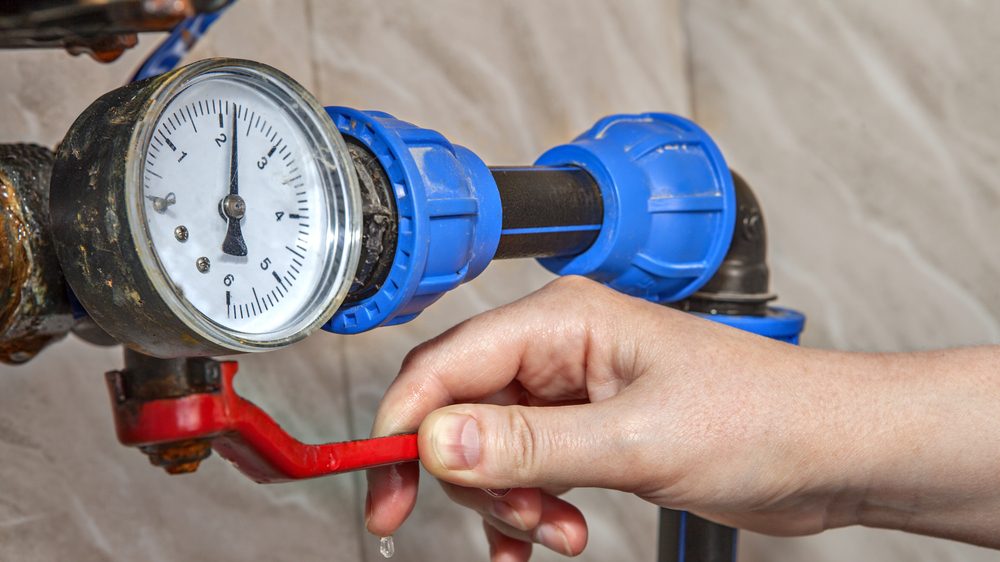
During plumbing emergencies, such as a burst pipe or another plumbing catastrophe, it is important to know where your main water shut-off valves are located and how to shut them off. When you have a sewage backup or an overflowing appliance, you don’t want to look like a chicken with its head cut off looking for how to turn off your water supply.
A little knowledge about where your plumbing valves are located and how to shut them off will go a long way – you may find yourself sprinting there someday. In addition to isolation shut-off valves, which are connected to specific areas of your home, there is also a main water shut-off valve which shuts off water to the entire plumbing system. It’s good to know where both your main water valve and all the individual isolation valves are located. Let’s start with the isolation valves.
Table of Contents
Where Are My Isolation Valves?
Isolation valves, also known as service valves, are normally located near the fixture that it is connected to, whether it be a toilet or a washing machine. There are separate water valves for each of your different plumbing fixtures, allowing you to work on a small section of your plumbing system without having to adjust the main water shut-off valve that controls your entire system.
Isolation valves are designed to help you deactivate a specific section of your system without impacting other water-using fixtures or appliances in your living space. Next time you use your toilet, washing machine, or sink, look for the isolation valve, connected to the pipes entering your fixture.
For your washer machine and sinks, there will be separate hot and cold water supply lines with separate shut-off valves, while your toilet only has one cold water shut-off valve. If you have an overflow problem with one of your fixtures, simply shut off the isolation valve to contain the situation.
How Do I Turn Off Isolation Valves?
There are several different types of isolation valves, but they all are pretty simple to turn on and off. If you are finding it difficult to turn the valve, try putting on work gloves or use a wrench if necessary, but never force a valve open or closed. It’s a good idea to turn your isolation and main water valves on and off every once in a while so they remain easy to turn.
Warning: Never try to force your valve open or closed! You could end up breaking the valve and causing a plumbing nightmare. Hand tightening and loosening should be all you need. If the valve seems stuck, don’t try to force it. Call your plumber instead as you could end up causing irreversible damage.
Gate Valve:
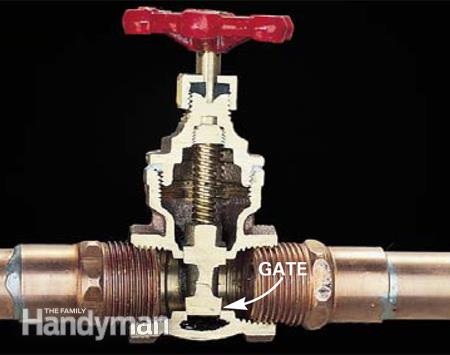
A gate valve closes off the water supply by lowering a brass gate into a slot. They should always be completely on, or completely off. To turn off a gate valve, simply remember the old adage, “Righty tighty, lefty loosey.”
Ball Valve:
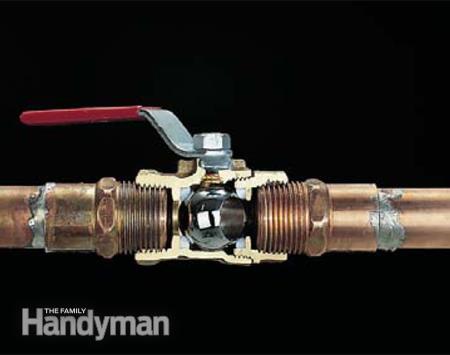
A ball valve is a little different. A ball valve uses a ball with a hole in it to pivot into the right position. To turn a ball valve off, turn the lever so that it is perpendicular to the pipe. To turn it on, make sure the lever is parallel to the pipe.
Compression Valve:
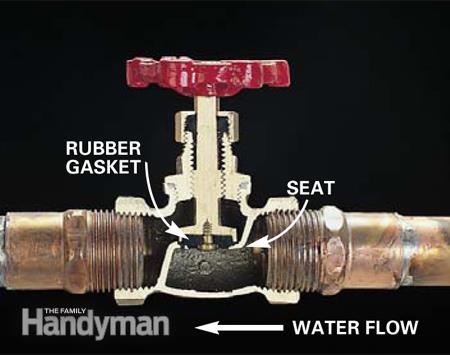
Images: familyhandyman.com
Compression valves, also known as stop valves, use a rubber gasket that gets screwed into the middle portion of the valve, stopping the water flow. As with the gate valve, turn the handle right to close off the water supply and loosen it to the left to open it up. Since the water path isn’t the most efficient, these types of valves will only be used as isolation valves for sinks, toilets, etc.
If you have an under-the-sink or under toilet leak, read this guide for replacing a shut-off valve. You want to make sure you are buying the correct replacement valve since compression valves have different fittings.
It may be best to speak with a professional plumber though, as you could benefit from switching to a modern quarter-turn ball valve design. Read about the difference between compression and quarter-turn shut-off valves here.
Main Water Shut-Off Valve
Knowing where your isolation valves are located is great for shutting off water to just one area of the home. But what if you need to shut off the entire water supply entering your home? We highly recommend that every member of the household knows where the main water shut-off valve is located and how to turn it off in the case of an emergency.
Tips & Insights: What Is the Life Cycle Of a Faucet?
Where is My Main Water Shut-Off Valve?
Every house has at least one main water shut-off valve. Look for where the plumbing enters the home to find yours. There are a couple of main spots to check inside first before heading outside to look. You can save yourself some time by checking your property inspection report if you know where that is.
If you have a basement and crawl space, the main water shut-off is probably located in the basement, near the front wall of your home (closest to the street). It should be very close to your water meter, where you can detect the amount of water your home uses and if you have a plumbing leak somewhere in the system, although some homes don’t have a meter.
The handle will be a strong gate or ball valve, looking something like this:
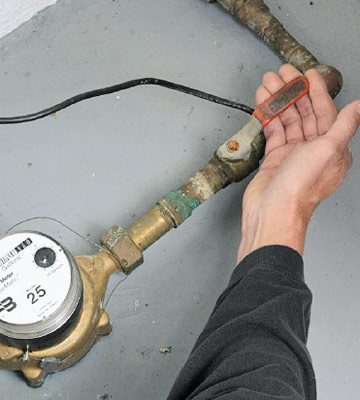
Source: diyadvice.com
If your home was built on a slab, the main water shut-off valve could be located near your hot water heater or inside of your garage. If you cannot find your main water shut-off inside the home, the next place to look is outside, near the front curb. What you’ll be looking for is a cement box, also known as a Buffalo box, buried underground. The visible portion of the box will probably be a heavy iron cover that says “WATER” or “WATER METER” on it. You may need to dig around the grass to find the lid.
Once you find the lid to your water meter, you can usually pry it open with a large screwdriver, but sometimes it may require a special “meter key” to open. You can find meter keys at any local hardware store. Additionally, the valve inside the box may require a special key as well.
Once you get the lid open, you may find something like this:
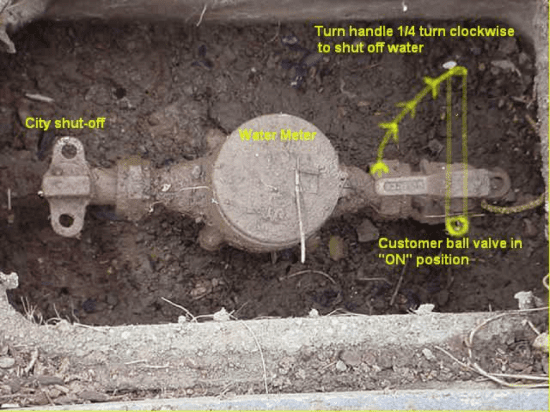
Source: keizer.org
Never touch the city side of the valve as it is illegal to do so. Also, if you wish to adjust the water pressure at any of your valves, make sure you know exactly what you are doing; otherwise call a plumber. Additionally, if you have any questions about your main water shut-off valve, don’t hesitate to call your local utility company or plumber for answers.
If your pipes freeze, do NOT turn off your water. In fact, you should turn both hot and cold lines on a little bit as you begin to thaw your pipes (always thaw in the direction of water flow). If your pipes burst, then you SHOULD turn off the main water valve immediately and call your plumber.
Tips & Insights: How to Prevent Frozen Pipes
When Should I Turn Off the Main Water Valve?
A damaged water heater or a loose connection to an appliance such as a dishwasher, washing machine, or refrigerator can cause severe water damage in your home. If you encounter a water leak in your kitchen or laundry room, the easiest way to to prevent water damage is to turn off the main water shut-off valve to stop the circulation of water on your property.
It may also be a good idea to adjust your water shut-off valve prior to leaving for a vacation a trip. Disasters can happen while you are away from your house. To prevent a food or leak, turn off the main water supply to your home any time you are away for more than 24 hours.
Is There a Downside to Turning Off the Main Water Supply?
There is no drawback to turning off the main water supply in your house. It only takes a couple of minutes to find and turn off the shut-off valve and it can save thousands of dollars in water damage on your property.
Can Turning Off the Main Water Shut-Off Valve Prevent Burst Pipes During the Winter?
Although it may seem tempting to turn off your water supply on a cold day to prevent damage on your property, your house is still susceptible to burst pipes when the temperature drops. The plumbing pipes are still storing water and can burst if you have insufficient insulation in your walls.

Emergency Plumbing Services
Gold Medal Service offers 24-hour service and customer support so even if you experience a pipe emergency in the middle of the night, we’re there for you. Our team of licensed plumbers offer various types of plumbing services such as water line replacement, drain cleaning, water heater repair, sump pump replacement, tankless water heater installation, and water line repair.
If you need help insulating your pipes or replacing old, deteriorating ones, don’t hesitate to give us a call. Our team has the tools necessary to help you fix your malfunctioning plumbing system. Contact our technicians by phone at (732) 638-4317 to receive assistance with the water valves in your living space.


